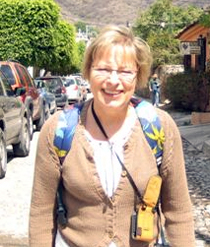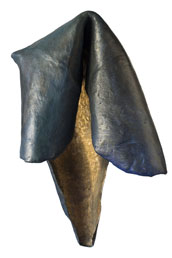The paddle disappeared, quickly floating out of reach. Pretty drunk, or whatever it was that affected him, Pete just about cried, looking very upset, unsure what to do next.
“Sit down, please!” I shouted. “Do not move!” Because the back of the boat was heavier than the front, both men sitting there, the current pushed the boat sideways, a dangerous position to be in. Water pushing up against the side of the boat started splashing us. The canoe felt unstable. Hank called out: “I don’t know what to do!”
“Just let it go, we can’t catch that paddle anymore,” I shouted. “Keep the boat straight. Give it a bit more on the throttle; maybe that will help.”
The boat straightened slowly, moving again with the current. We were able to keep it there for the next few minutes that seemed to last an eternity, until we safely left the rapids behind.
We relaxed. Pete sat sheepishly on his spot and would not look anybody in the face. Baby George had been asleep throughout this episode. Daisy seemed unaffected by the panic, nothing showed on her face, but she was holding on tight to her baby.
Who could have saved the baby in this cold water if the boat had tipped over, I thought? Who would have survived the current? We had no life jackets or any safety equipment on board, no flares, no extra food, no extra lifesaver we could throw at someone in the water. I was not a strong swimmer; I would probably not float very long wearing all those clothes.
Pete went to sleep. Daisy, Hank and I were quiet, floating along in silence, each occupied with our own thoughts. That went on for another two hours, until we were wondering when the ramparts would announce their presence.
I was trying to see something, anything, ahead, but saw nothing different. I looked into the water, which was opaque since the Mountain River had mixed its yellowish, turbid water with the clear Mackenzie stream. The water had changed and seemed as if it was boiling, little bubbles coming up, and bigger bubbles even as I looked, causing a lot of turbulence, seemingly coming from underneath the boat.
“Hank, look down at the water, do you see that?”
“Yes, it looks like boiling, what is that?”
“I am not sure. Daisy, do you know what that is?”
Before Daisy could answer, we saw the big wave coming at us out of nowhere with a speed of maybe fifty clicks an hour. I estimated it to be about two to three meters high.
“Oh my God! What do I do?” Hank shouted while steering the boat sideways, as if to turn around.
“Damn it, Hank, not sideways! Keep the boat straight whatever you do! It’s going to sink if the wave hits us that way. Go right through it! Keep the boat straight!”
Pete had woken up due to our hollering back and forth, looking dazed. Daisy had a worried expression on her face, but remained calm, holding tightly to little George, who had also woken up.
”Yes, keep the boat straight, Hank,” Daisy said.
The wave struck us full force, splashing water on and around us. We did get a bit wet from the spray that hit the front of the boat. The boat shuddered on impact, but Hank kept it straight. That was all.
We laughed, let out some whoops, felt very brave and pleased with ourselves, having once again escaped a worse fate. The water now was boiling hard all around us. Gradually, the movements dissipated over about ten minutes and only the fast current was left.
Now we saw the ramparts to our right, after a widening of the river to twice its size. We could not see it earlier, as the river bent off towards the right, hiding the riverbanks.
A small boat came towards us with two Dene men, one young, and an elder.
“Hi, welcome to Fort Good Hope. Are you here for the assembly?”
“Yes, hallo, how are you?”
“Good. We need to know whether you have any liquor on board. We are a dry settlement and no one can bring any liquor. Do you have any?”
“No, we don’t. This man here drank it all, ha, ha.” Hank pointed at Pete who shot him a dirty look.
“Oh, good then. Please, continue and have a good stay with us.”
“Thank you very much.” Hank and I said simultaneously.
We were delighted to have made it safely to Fort Good Hope and were full of new energy. Hank was all chatty. I was very curious as to what awaited us beyond those high riverbanks.
We pulled the canoe, onto the riverbank. We saw some small roofs on the top and a path leading onto the higher ground. About five other boats were pulled up on shore. An improvised, temporary wooden dock stretched into the water from the shore.
We unloaded our boat and walked up the path. The settlement stretched out before us: a flat terrain with about twenty wooden log houses and about twenty other wooden structures: small, old homes. To the right was a larger, industrial-looking building. Someone explained that was the Hudson Bay Company store. Off to the left was a brand new, modern building with glass and cement.
“What is that?” Hank asked Daisy.
“That’s the school and gymnasium where the meetings and the dances are.” Daisy’s grandmother had come to welcome us and Daisy and the baby left us. Pete followed Daisy.
Daisy had explained some of the logistics and the purpose of the meeting: the Assembly of First Nations of the North West Territory was having elections. Band members of the territory would (re-)elect delegates whose terms were up, to represent them on the council of First Nations. The council would then elect a new territorial chief.
This language and form of government was Greek to me. I was unable to put my experiences in Fort Good Hope into any kind of meaningful perspective, until after I immigrated to Canada, had studied First Nations history and had met many First Nations people in my later work in northern Alberta.
Hank knew quite a few people, due to his work in Norman Wells; he introduced me among others, to a George Erasmus, who would become national chief three years later. I was treated like a guest and was invited to all of the communal meals. Daisy’s grandmother made sure of that by taking us to our first, ensuring us we should return for each meal. I witnessed the installation of the newly elected chief, George Erasmus, and the daily celebrations and drum dances, which continued till the early hours. The food: caribou, musk ox, deer and fish, brought by the visitors from all over the territory, was roasted over in-ground pits, supplemented by canned food and breads.
Many young Dene arrived at our tent inquiring about the purpose of our trip. They explained tirelessly to us–two of only a handful of Caucasian visitors–what the background was of First Nations’ push for self-government, the main subject of the discussions, giving us a brief history lesson.
My first impression was that these young people were very articulate, well-educated representatives who truly wanted to make a difference within their lifetime, a political force to be reckoned with. After the last day, Hank and I returned to Norman Wells by plane, as the weather had turned and we had become smarter.
My trip to Fort Good Hope is etched in my mind and in my heart; it set the tone for my wish to live in Canada, this land of endless beauty, the last vestiges in the world of true wilderness. Since that memorable trip, I made my home and have raised a family of my own in Canada. I give much credit to the Sahtu Dene First Nation of Fort Good Hope who first taught me about the generosity and resilience of Canada’s people.





No Comments so far ↓
There are no comments yet...Kick things off by filling out the form below.